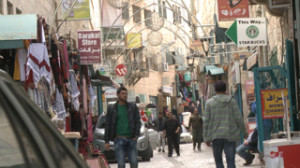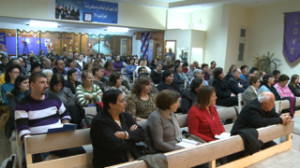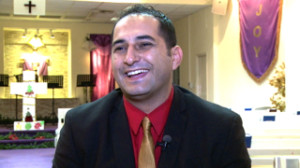
By Marney Blom
Bethlehem. No other place on earth remotely compares in historic significance to the small city of 33,000 situated just five miles down the road from Jerusalem. It was here, according to Scripture, where Heaven intersected with Earth when the Son of God, the Saviour of mankind was born as a Jewish baby.
Fast forward 2000 years. Bethlehem looks more like a prison than the humble manger village of Jesus’ birth. Surrounded by stark concrete graffiti-covered barriers, it’s economy is dismal and the people, for the most part, unhappy. Ironically, at one time the home of Israel’s greatest ruler King David, under the Palestinian Authority Bethlehem is no longer considered Israel proper. Jewish Israelis are not even permitted to go there.
Christians, who used to be a healthy majority surpassing 80 percent of the town’s population, now number less than 25 percent, and Evangelicals less than one percent.
Attrition can be attributed to several factors: a lower birthrate among Christians compared to Muslims, and an economic downturn that is forcing Christians to seek employment abroad.
With the recent Gaza-Israel conflict plus the upsurge in terrorist attacks, tourists are afraid to go to Bethlehem, and as a result, its economy has been hit hard. Bethlehem suffers a 25.7 percent rate of unemployment — the highest in the region, and a poverty rate of 22 percent, according to Bethlehem’s Mayor Vera Baboun. “Despite the fact that we are a tourist city,” said Mayor Baboun from her office overlooking Manger Square, “Bethlehem is affected by any political development.”
The concrete barrier separating Jerusalem from Bethlehem has also contributed to economic difficulties. It restricts citizens of Bethlehem from accessing jobs in Jerusalem, Ramallah, other parts of the Palestinian authority and Israel proper. It is a daily inconvenience for the people of Bethlehem, but is vital for Israel’s security. Its existence has successfully lowered the number of terrorist attacks on Israeli citizens.
Baboun, a Roman Catholic Palestinian Arab and a member of Fatah, ultimately attributes her city’s woes to the absence of a two-state solution to peace: “And always I say it: as long as no political solution is taken, the situation in Bethlehem, and the Christian identity in Jerusalem will be affected.”

Evangelicals especially find life difficult in Bethlehem. In addition to the daily problems residents face, Christians also suffer from fear of persecution because of their faith. “They are afraid to say they are Christians in some neighbourhoods – afraid to speak out if there is any problem, or anything that they don’t like that is bothering them … anything that is affecting them as a family, as a faith base, as a religious base. They know there are always repercussions in speaking out,” admits 33-year-old Pastor Steven Khoury, assistant pastor of First Baptist Church of Bethlehem, and Vice-President of Holy Land Ministries. “When they look around they realize they are the only ones in the neighbourhood where there used to be 50 families. They are down to two or three families.”
Intimidation and delegitimization of the tiny Evangelical community of Bethlehem, which numbers less than a thousand, reportedly comes from the government, the Islamic community, and even from the more traditional
Bethlehem churches – Roman Catholic, Orthodox, Armenian and Lutheran – whose steeples dominate the Christian landscape. As a result, members of the Evangelical congregation have been denied marriage and birth certificates, passports and government services. Others have been harassed, beaten, and some have even died for their faith.
“In my heart, I don’t want to forgive Hamas,” said Anisa Ayyad, mother of martyred Rami Ayyad, killed by Hamas in 2007 for working at the Gazan Christian bookstore, “but because of my faith in God …. There are verses in the Bible that say, ‘Leave it to me, vengeance is mine.’ The Lord will repay. The Lord teaches us to forgive. People have to forgive.”
We have noticed a trend: the spiritual growth in the current members [increases] when there is some sort of attack, discrimination and persecution…
Those among Evangelicals who have remained in Bethlehem claim, however, that harassment and discrimination has made them stronger. “We have noticed a trend: the spiritual growth in the current members [increases] when there is some sort of attack, discrimination and persecution against them,” noted Pastor Khoury. “It is a first century rule of thumb.”

Persecution has also made these Christians bold. For the second year in a row they have won the battle to place a large, red evangelistic billboard with a strong Christmas message in the centre of town. It’s a clear sign that despite the many struggles, the true message of Christmas in this little town is alive and will not be silenced.
Marney Blom is news director for the Acts News Network.
Copyright 2014 © Acts News Network, Inc.
